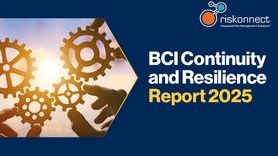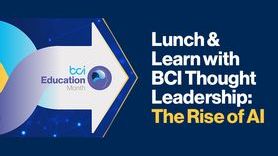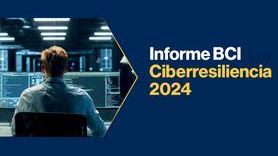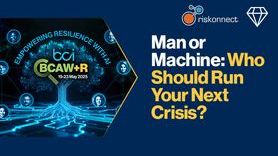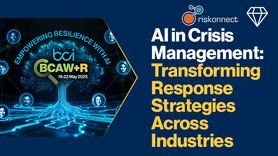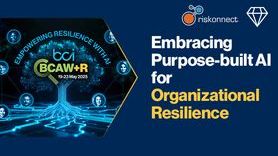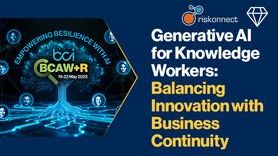Behind the Ballot: Future of the Profession
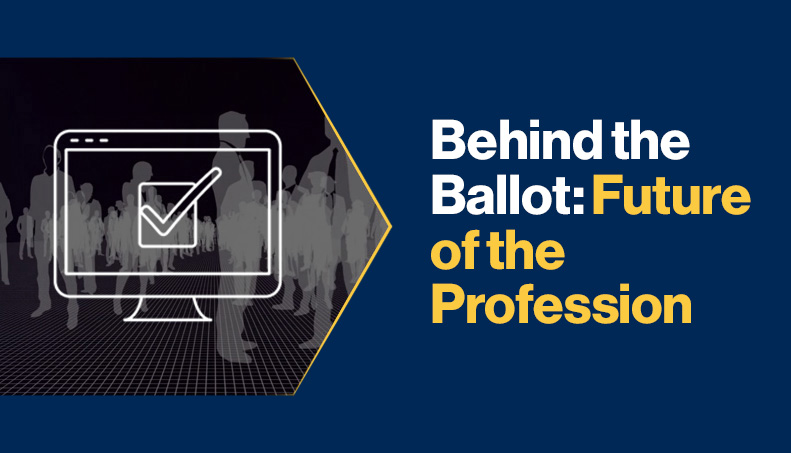
Our Members asked board election candidates (Question 1 of 2): Do you believe AI will fundamentally change the role of business continuity professionals? If so, how should the BCI prepare its members for this shift?
Atiq Bajwa FBCI
AI will fundamentally transform business continuity by augmenting, not replacing the resilience professionals. It will automate emerging risk monitoring, modelling, simulations, and impact analysis, allowing practitioners to focus on strategic decision-making and stakeholder engagement, the skills AI cannot replace. The shift demands that BC professionals move from administrative roles to strategic advisors who interpret AI insights within organizational context. Those who thrive will combine AI's analytical power with unique human judgment, creativity, and ethical reasoning. BCI can prepare members through comprehensive training on AI literacy, data analytics, and emerging technologies' risks and opportunities. By proactively upgrading member capabilities, BCI can ensure the profession remains a value-adding discipline, positioning BC professionals as the essential interpreters who transform technological insights into actionable steps to ensure organizational resilience.
Desmond O'Callaghan Hon FBCI
AI is already changing the BC professional’s role in starting to drive “new” methodologies. Is this change fundamental, or transient? To keep modifying and (hopefully improving) the ways we do things, as we always have, does not mean the foundation has shifted. The Competency Framework is as solid as ever. I see the professional’s role as leading / coordinating efforts to build and continuously improve operational resilience, with the goal of preventing and withstanding disruption to the extent possible. Why should th fundamental role change? The core concepts and principles of BCM stand firm. Focus should be on the evolution of practical methods, technological and otherwise, and this should be the ongoing remit of the BCI - to provide education, thought leadership and influence.
Federica Maria Rita Livelli MBCI
Undoubtedly AI will impact all security and resilience figures of organizations, including BCI professionals who, with the massive use of data and the adoption of increasingly sophisticated technologies, will have to adopt a more modern approach to face the challenges the use of AI and convert the BC professional into E-BC professional, capable of managing data in real time and AI platforms for complete management of risks, business continuity and cybersecurity. The BCI will, therefore, have to support this shift by promoting an innovative culture of resilience through training and awareness courses and ad hoc exercises to equip E-BC professionals with the necessary hard skills and soft skills. It is about knowing and understanding the present context and to guarantee security and business continuity, by ensuring a continuous flow of information and sharing lessons learned and best practices.
Gregory Descamps MBCI
I don’t believe AI will fundamentally change the role of business continuity professionals, but it will significantly enhance their efficiency and impact. By combining their expertise with AI tools as a practical resource, BC professionals can work more agilely, accurately, and effectively, producing more concrete and actionable outcomes. Often seen as central to organizational resilience, BC professionals sometimes feel isolated within their businesses. AI can act as a personal guide, providing direct support and insights that help them engage more confidently, make informed decisions, and stay closely connected to their organization’s needs. Additionally, AI can help them connect with broader networks, breaking silos and facilitating collaboration across sectors and geographies. To prepare members for this shift, the BCI should provide practical guidance, training, and case studies on using AI responsibly, emphasizing it as an enabler rather than a replacement for professional judgment.
Disclaimer: An AI tool was used to conduct grammar checks and refine the language in this response
Kelly Blakeley MBCI
Yes - and we see this reflected in the BCI Vision 2030 Report and other publications such as the World Economic Forum Future of Jobs Report. The challenge (from speaking to members) we have is that with the multitude of information out there on this topic. We need someone to cut through the ocean of knowledge because people and organisations are overwhelmed. There is a need for a body of professionals to be the trusted voice, source of guidance, ensuring it is accessible and relevant for us as a community; that’s the role of the BCI. Through its community, visibility, membership, credibility, training and thought leadership the BCI will support its members through this shift.
Maura Santunione MBCI
Yes, I truly believe AI will fundamentally change the roles in Business Continuity by elevating them to a strategic level. The BCI has a critical opportunity to accompany this transformation for both organizations and individual professionals. It can achieve this by designing new roles that fit the needs of the evolving business context, and by creating the necessary training and certification paths to equip members with future-proof skills.
Mohamed Hassan MBCI
Yes, I believe AI is already being used across various stages of the BCMS life cycle, as many BCM automation vendors have integrated AI into their software. I have seen practical use cases where AI scans BCM documents to identify missing or outdated sections based on predefined templates, automates parts of the BIA process, and performs real-time mapping between business functions and supporting IT systems highlighting gaps between Business and Technical RTO/RPO values. However, AI is still limited in handling activities that require critical decision-making during disruptions or recovery analysis, as such tasks demand human judgment and experience. To prepare members for this evolution, BCI can:
- Launch webinars, research, and thought-leadership sessions on AI and emerging technologies in BCM and resilience.
- Develop tailored training programs and partner-led sessions to share best practices.
- Create an online collaboration platform, formal AI guidelines, and ultimately, a Resilience AI tool trained on expert BCM content.
Disclaimer: An AI tool was used to conduct grammar checks and refine the language in this response
Rajesh Pillai MBCI
Yes, AI will fundamentally reshape the role of business continuity professionals by transitioning their focus from static planning to dynamic, intelligence-driven resilience strategies. Traditional continuity tasks will evolve into managing predictive analytics, automation, and real-time decision-making powered by AI. Professionals will need to interpret complex data models, oversee algorithmic outputs, and ensure ethical governance of technology-driven processes. To prepare members for this shift, BCI should lead with a structured roadmap that includes specialized training in AI ethics, data analytics, and automation, supported by globally recognized certifications. Practical exposure through scenario-based simulations and innovation labs will be critical to building confidence in applying AI tools responsibly. Additionally, BCI must embed governance frameworks and foster collaboration with technology providers to ensure resilience remains secure, ethical, and adaptive. By equipping members with these capabilities, BCI can position the profession as future-ready leaders in operational resilience.
Disclaimer: An AI tool was used to conduct grammar checks and refine the language in this response. It was also used to assist in drafting the responses. AI served strictly as a writing aid, not for generating original ideas or decision-making. Ethical use and transparency were prioritized.
Sanjay Vijayaraghavan KV MBCI
Yes, AI will change how business continuity professionals work, but it won’t replace them. The BCI can help members prepare by: - Showing how AI can support faster risk detection and decision-making. - Helping members learn to work with AI tools, not compete with them. - Encouraging continuous learning and adaptability as core professional skills. - Promoting ethics, transparency, and human judgment alongside technology. - Sharing success stories that show how people and AI can build stronger resilience together.
Simon Contini FBCI
Yes, AI will indeed transform the way Business Continuity Resilience people work, with automation, predictive analytics, agentic intelligent systems, and agents becoming increasingly available. Professionals will move from reactive planning to proactive strategy and context oversight, maybe even across different agentic tools. They should prepare their members by providing instruction on the use of AI tools, ethical concerns, and contextual integration needs (example, supply chain dependency). The BCI could promote discussions on the ways AI is transforming risk, how we can better appreciate secondary and cascading risk scenarios, technology and organizational resilience, and decision-making, all to keep members responding to a rapidly changing world. The ongoing development of the GPG will be critical to codifying that. This is an evolutionary process of business continuity and resilience; the danger is that if the BCI does not keep moving forward, evolution can reverse.
Disclaimer: An AI tool was used to conduct a grammar and spell check in this response.
Question 2 of 2: How can the BCI maintain its relevance and leadership in a world where resilience increasingly depends on technology-driven solutions?
Atiq Bajwa FBCI
BCI can position itself as an innovation leader, bridging traditional BC principles with emerging technologies. This requires undertaking regular research on technology-driven risks including AI failures and translating complexity into actionable member guidance. The Good Practice Guidelines should be updated more frequently due to rapidly changing technological landscape. Ideally, BCI should position business continuity as the discipline that ensures technology serves resilience rather than undermining it. Therefore, making BC professionals essential strategic partners in every technology transformation. By leading rather than following technological change, BCI can secure both its relevance and the profession's future value.
Desmond O'Callaghan Hon FBCI
Resilience depends of course on a lot more than just technology. People and personal resilience are paramount. Physical infrastructure other than technology still matters. Relationships and interactions with other organizations affect resilience. Technology is one large piece of a complex puzzle, but it is not the whole story. I believe the BCI can maintain relevance and leadership by remaining faithful to the core concepts and principles of BCM on which it was founded, while embracing change and innovation in practices. Our competency framework is the gold standard for certifucation and this must not be diluted in the name of technological advance. Once there were just a few specialist BCM software providers, now there are many, but the foundation has remained the same. I liken the BCI to a lighthouse on the rocks, and we have to keep the light shining.
Federica Maria Rita Livelli MBCI
The BCI must be able to navigate the modern technological complexity, while maintaining the business vision and communication skills necessary to guide BC professionals to make strategic decisions in contexts of increasing uncertainty. Therefore, in order to maintain its relevance and leadership, it will also have to: dialogue with other security associations and institutional entities; establish partnerships and common working tables; strengthen its position as thought leadership and point of reference for legislative entities; become a spokesperson for the needs of BC professionals and promote an endless path towards cyber resilience. As Lavoiraire said, “Nothing is created, nothing is destroyed, everything is transformed”.
Gregory Descamps MBCI
I am deeply convinced of the importance of human relationships. While resilience increasingly depends on technology-driven solutions, there will always be humans managing, interpreting, and acting on these systems. The BCI can maintain its relevance and leadership by connecting peers, sharing key insights, and highlighting best practices from around the world. Creating a sense of belonging within the global resilience community allows members to learn from each other, strengthen their skills, and navigate challenges more effectively. As I often say, resilience and BCM form a small world, and BCI’s role is to connect individuals across it, enabling collective growth. Just as computers are more powerful when interconnected, resilience professionals become stronger when they share knowledge, collaborate, and support each other. By fostering these human connections alongside awareness of technology-driven solutions, BCI can continue to lead and equip members for success.
Disclaimer: An AI tool was used to conduct grammar checks and refine the language in this response
Kelly Blakeley MBCI
The BCI will be our human network in the age of AI. Its position as a community, global network of members, partners and thought leaders will become increasingly important in supporting those who make up our organisations by providing a global ‘resilience infrastructure’ and a trusted source of guidance. There will be a deeper need for capabilities in operating alongside these technologies to support organisations having to navigate a volatile, polycrisis world. The BCI should focus as a human network on driving collaboration (as outlined in the BCI Vision 2030 report), having oversight of relevant technology, regulations, and greater sophistication of human skills from a technical and leadership/management perspective.
Maura Santunione MBCI
As it is since their first years, BCI was recognized as pillar in BC standardization and guidance definition, the BCI can maintain this leadership in a technology-driven world by proactively investing in three core areas: 1. Fostering Core Competencies and Cooperation. 2. Prioritizing High-Level Research into emerging digital risks and Future Design. 3. Driving Innovation in resilience, antifragility frameworks/standards or Identifying and introducing new approaches.
Mohamed Hassan MBCI
I believe this is an excellent question, as the world continues to evolve digitally and emerging technologies are playing a fundamental role in supporting businesses across all industries. BCI could focus on developing a comprehensive resilience technology awareness program for its existing leaders to ensure they possess the necessary knowledge to balance resilience principles with technology-driven solutions. BCI should also update its leadership selection criteria to include experience in resilience technologies as a key requirement. Furthermore, BCI could integrate technology-driven resilience solutions into its strategic objectives to remain aligned with global trends. In addition, BCI should prioritize building partnerships with resilience technology firms and research organizations and develop a strategic plan to leverage leadership expertise and propose new initiatives that enhance value for all members of the BCI resilience community.
Disclaimer: An AI tool was used to conduct grammar checks and refine the language in this response
Rajesh Pillai MBCI
To maintain relevance and leadership in a technology-driven resilience landscape, BCI must position itself as the global authority on integrating innovation with continuity principles. This requires a proactive strategy that combines thought leadership, standards development, and capability building. First, BCI should continuously update its frameworks to reflect emerging technologies such as AI, IoT, and blockchain, embedding governance and ethical considerations at their core. Second, it must invest in research and benchmarking to anticipate future disruptions and publish actionable insights for members. Third, BCI should expand digital learning platforms, certifications, and scenario-based simulations to equip professionals with practical skills for tech-enabled resilience. Strategic partnerships with technology providers and regulators will further strengthen credibility and influence. By fostering collaboration, promoting ethical adoption, and driving innovation, BCI can ensure its role as the trusted guide for resilience in an increasingly digital and interconnected world.
Disclaimer: An AI tool was used to conduct grammar checks and refine the language in this response. It was also used to assist in drafting the responses. AI served strictly as a writing aid, not for generating original ideas or decision-making. Ethical use and transparency were prioritized.
Sanjay Vijayaraghavan KV MBCI
To stay relevant in a technology-driven world, the BCI can: - Lead conversations on how technology and resilience work together. - Offer simple, practical guidance on using AI, data, and automation responsibly. - Build partnerships with tech experts and innovators to stay ahead of trends. - Keep human judgment, ethics, and trust at the heart of all its standards. - Create spaces for members to learn, experiment, and share real experiences. By blending technology insight with human values, the BCI can remain the trusted voice of resilience.
Simon Contini FBCI
Being inclusive, empathetic, energetic, collaborative, present, and committed to never-ending evolution. Encouraging more members to contribute and encouraging other contributions to the research will further establish the BCI as the benchmark for research inside organizations and also warrant recognition as an academic reference in industry. Broadening the breadth of AI will further bring it to the fore. We may need a new indicator similar to CPD that shows the research surveys we have completed and those completed that we shared. Though nimble and agile are prevalent and essential, change for the sake of change is not. So, change adaptation must be done with care and purpose. Small, ongoing changes over time add up to transformational changes, but they will keep more people on the journey. People and communities bringing context and ideas are what make and will continue to keep the BCI relevant for the future.
Disclaimer: An AI tool was used to conduct a grammar and spell check in this response. Its use was also declared in the second response.








